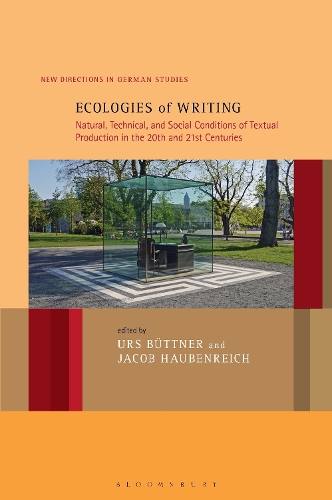
Ecologies of Writing: Natural, Technical, and Social Conditions of Textual Production in the 20th and 21st Centuries
(Hardback)
Publishing Details
Ecologies of Writing: Natural, Technical, and Social Conditions of Textual Production in the 20th and 21st Centuries
By (Author) Dr. or Prof. Urs Bttner
Edited by Dr. or Prof. Jacob Haubenreich
Series edited by Prof Imke Meyer
Bloomsbury Publishing USA
Bloomsbury Publishing USA
27th November 2025
United States
Classifications
Professional and Scholarly
Non Fiction
Literary studies: c 1900 to c 2000
Literary theory
History of scholarship (principally of social sciences and humanities)
Physical Properties
Hardback
240
Width 140mm, Height 216mm
Description
Drawing from case studies in 20th century German literature and theory, the contributors to this volume explore the multiple dimensions behind and alongside authorship that constitutes the "ecology" of writing.
Over the last few decades, a resurgence of interest in historical and contemporary writing processes, fueled in part by the development of digital media, has developed alongside the emergence of new conceptions of material-human agency and the environment. What would it mean to apply these conceptions to the phenomenon of writing As the essays in this volume explore, writing is never the purely mental activity of a solitary mind; it is inherently socially embedded and always more-than-human.
Examining the early 20th century to the present, a period of dramatic media-technological transition in which writers become increasingly self-reflexive and responsive to the materials and changing environmental circumstances of their craft, Ecologies of Writing expands the frame to encompass the vast array of material, social, environmental, and economic influences that all inform the practice of writing. Case studies draw on German-language literature and theory, including works by Franz Kafka, Thomas Mann, and W. G. Sebald, and recent theories of human-material agency, media theory, and ecocriticism.
Author Bio
Urs Bttner is Feodor Lynen Fellow of the Alexander von Humboldt Foundation at the University of Oxford, UK. He previously held positions at Leibniz University Hannover, Free University Berlin and Heinrich Heine University Dsseldorf. He taught as Max Kade Professor at the University of Illinois at Urbana-Champaign and received a Visiting Scholarship at the Institute of Advanced Studies at the University of Durham.
Jacob Haubenreich is Assistant Professor in the Department of Modern Languages and Literatures at Johns Hopkins University, USA. He has previously held positions at Southern Illinois University, Carbondale and the College of the Holy Cross, as well as positions as Visiting Scholar at the Austrian Academy of Sciences and in the Marbach Weimar Wolfenbttel Research Association.
